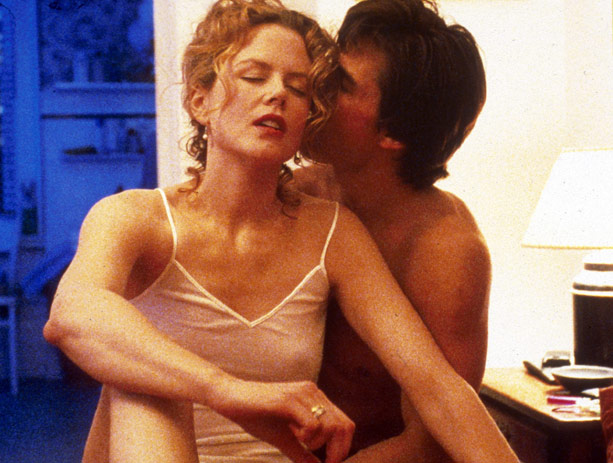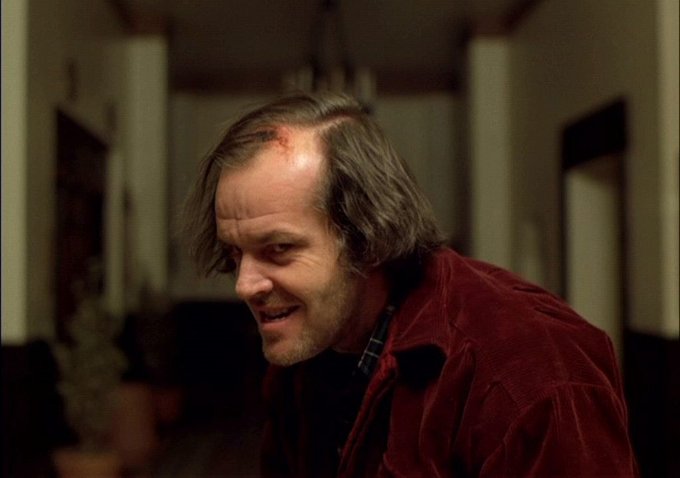By providing your information, you agree to our Terms of Use and our Privacy Policy. We use vendors that may also process your information to help provide our services. This site is protected by reCAPTCHA Enterprise and the Google Privacy Policy and Terms of Service apply.
Stanley Kubrick’s Longtime Producer Trashes ‘Room 237’ and Lists ‘Eyes Wide Shut’ As His Favorite Kubrick Film

Jan Harlan acted as a
researcher and producer for director Stanley Kubrick for over thirty years,
contributing to such iconic films as “A Clockwork Orange,” “Barry Lyndon,” “The
Shining,” “Full Metal Jacket” and “Eyes Wide Shut.” Harlan
is one of three jury members on the docket of this year’s Bermuda
International Film Festival, which began on March 21. Last week, BIFF
hosted a panel discussion featuring Harlan as the main subject where he
discussed the art of filmmaking for festival attendees, filmmakers and students.
Before the panel, Harlan sat
down with Indiewire to discuss his work with Kubrick, including the in-depth
exhibit that he’s helped put together, and to offer some advice to young
filmmakers. Check out the accompanying video of the panel after the text
Q&A for more insights from Harlan.
Tell me about how you first started working with Stanley
Kubrick.
I have known Kubrick since I
was at school. He was married to my sister when I was very young. So I came to
know him very well. It was after “Dr. Strangelove” that he came back
from England to New York. It was much later in ’69 when he invited me to join
him to go to Romania on “Napoleon,” that was his big project and his
great project. So my wife and I and our baby we came to England, and thought OK
we’ll stay there for 6 months and then go to Romania. But then MGM pulled out
of the project. But we got along very well. I liked him and he liked me and he
asked me to stay.
One of the first things we
did together was get the rights to “Eyes Wide Shut.” It’s called
“Traumnovelle” and he was very much in love with that story, but it
proved to be just too difficult, so he dropped it. He had already a contract
with Warner Brothers ready to go and he pulled out. He chewed over it for thirty
years. When he finally made it he really considered it his greatest
contribution to the art of filmmaking. Many people wouldn’t agree with him but
that doesn’t really matter. Then came “A Clockwork Orange.” That was
my first job as an assistant. I learned the basics of the business, but my responsibility
was never what you see on the screen.
 So were you a film fan before you started working
So were you a film fan before you started working
with him?
Always. I was absolutely. I
knew many, many movies. Anyway from “Barry Lyndon” onward I did what
I always do, negotiating and trying to get things. But since every film is
different it’s a very exciting life. Because you can’t compare “Barry
Lyndon” with “The Shining” or “Full Metal Jacket” or “Eyes
Wide Shut” there all totally different requirements. “Eyes Wide
Shut” was a great last experience to work with this man who was so
enormously critical of himself. It took forever to do.
I know that he didn’t want to be just another “mediocre”
filmmaker. He wanted them to last.
He had to be happy with it.
Lasting or not lasting was not on his mind. Also will the critics or the
audience like it? There’s nothing you can do about that. He had to like it.
Once he liked it that’s all he could do. And you just have to hope that many
people go with you and generally speaking enough people did. So his films were
a success.
Do you have a particular favorite?
I think it’s “Eyes Wide
Shut’ but I’m not objective because it may very well be because it was the last
time I worked with him, it was the last experience that’s imprinted on my mind.
And we talked also about “Traumnovelle” for over thirty years, you
know on and off. There was one point when he though of doing it as a black and
white, very cheap art house movie with Woody Allen in the lead. With Woody
Allen playing a straight, Jewish, American doctor in New York. What he liked is
universal; it’s a universal truth about the total destruction of jealousy and
sexual fantasy where everybody in the audience is an expert. So it’s a tricky
one. But anyway he wanted it in New York and he wasn’t happy with the script
and so he abandoned it and then “The Shining” was a walk in the park
in comparison, because it’s easy, you can do whatever you like. Nothing has to
make sense, it doesn’t matter you can do what you like.
Did you see “Room 237”?
Ah, so idiotic. Of course I
did. There’s nothing to like. It’s just dumb. I mean [the filmmaker] obviously
waited until Kubrick died. This happened to him in many cases, also this whole
story about him doing a fake moon landing. This was only possible after he was
dead. People come like worms; they creep out and take advantage of a guy who
can’t sue from the grave. At any rate, I don’t worry about things like that.
Tell me about the Kubrick exhibit you’ve put
together.
The exhibit is fantastic.
The whole exhibition was created because of the film institute in Frankfurt. We
were very resistant because why Germany? Kubrick really had nothing to do with
Germany; it should have really been New York or London where such an exhibition
should open because these were his two cities. But nobody came from New York
and nobody came from London to this very day. So Frankfurt pushed very hard,
and finally the federal government came and guaranteed certain funding because
they thought that Kubrick – it was irrelevant that he was American or lived in
England, he was a world artist like Picasso or Beethoven, it didn’t matter. He
was a really important artist of his generation. I’m sure it will come back to
America. But it should really come to New York. But nobody wants it.
Is there a lot of the “Napoleon” work in it?
“Napoleon” is very
much presented in that exhibition. And of course there’s this book on
“Napoleon” in the exhibit there’s this Taschen book, I think it’s the
only book made about a film that has never been made!
How come it never came together?
That’s a question for film
studio executives to decide because they have to evaluate, quite rightly, the
cost of doing it versus the potential audience, and I cannot judge this. Right
now we are talking about maybe a television series; that would be the solution,
no doubt.
Especially now since TV is so good.
Absolutely. Television is
now the answer, there’s no doubt about it. Finally it may come into it’s own.
 You have a very famous uncle. (Harlan’s uncle was the
You have a very famous uncle. (Harlan’s uncle was the
infamous Veit Harlan, who directed the Nazi propaganda film “Jew
Suss.”)
Yeah he was, I don’t know
much about him, but he was very famous in Germany. He did some schlock films,
some terrible movies. I can’t tell you much about it I would have to Google it
like you.
But my parents were opera singers, both of them. I grew up with music,
with classical music, that’s my home territory. I like great composers; it was
one of the first things that brought me together with Kubrick because I brought
to him “Thus Spoke Zarathustra.” I came for Christmas to England, and
he said to me [of “2001” A Space Odyssey,”] “The music I
don’t really like yet. Do you have anything that is really great, and comes to
an end, and is not too long?” So I brought a whole stack of LP’s and one of
them was “Thus Spoke Zarathustra” and he loved it instantly. He was
already taken by the title. It suggests something which is spiritual. He liked
that because his film actually was quite a spiritual film. “2001”
takes a big bow to the unknown or the creator of the universe. Kubrick was not
a religious guy at all, but he was very respectful to life and to the fact that
we know nothing. And we are surrounded by miracles. He was an agnostic.
That was always a sideline
of what I did later, I suggested music. I didn’t choose it, I suggested it. He
knows what he likes; he was very musical himself. He was very interested from
jazz to contemporary to Ligeti, which he used three times. Ligeti in “The
Shining” and Penderecki. “Dies Irae” by Berlioz is an
interesting example because the beginning of the film looks like it’s National
Geographic but it’s the music that tells you there’s something wrong here.
You do a lot of teaching now; what is your biggest
piece of advice that you give to students?
You’ve got to love it.
You’ve got to love what you’re doing because why should anybody else love it if
you don’t yourself? This goes for all of the elements. You’ve got to love your script;
you have to really have passion for wanting to tell a story. It’s a difficult
task because you know many students just have to make a short film as part of
their studies and it’s a big demand.. But on the other hand most of these films
are also not interesting. So it’s tough. I’m not saying it’s easy. You have to
love it and this is something I really love from Kubrick, he would not use
music he didn’t love. Now comes the question of what fits. Let’s talk about
music, what fits? Music fits if the director loves it. Does a Viennese waltz
fit as space music for a futuristic film? Of course it doesn’t. If you love it
enough and that’s what you want to do then it fits. This is artistic freedom,
yeah? Art is not about being realistic. Art is about being real. Big difference.
The video of the panel, which addresses even more
topics, is posted below, courtesy of BIFF and filmmaker Robert Zuill.
By providing your information, you agree to our Terms of Use and our Privacy Policy. We use vendors that may also process your information to help provide our services. This site is protected by reCAPTCHA Enterprise and the Google Privacy Policy and Terms of Service apply.


















